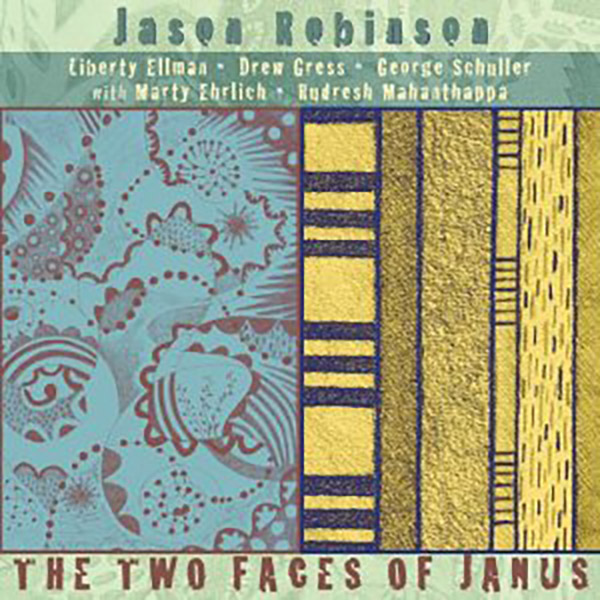
by Tim Owen
June 11, 2011
/ ALBUM
Robinson convenes a sympathetic band of fellow travellers to précis a lifetimes work, but with his face set squarely to the future.
Jason Robinson
“The Two Faces of Janus”
(Cuneiform)
The old two-headed Roman god Janus is usually invoked as a personification of change and transition from one time, condition, or vision to another. In his notes on his new album, titled “The Two Faces of Janus”, Jason Robinson has earthier perspectives foremost in mind. A former resident of California’s Bay Area, the saxophonist now resides in New York, and the Janus reference alludes to the album’s bi-coastal origins: the sessions were rehearsed on America’s west coast before being recorded in New York. Having invoked the long-standing perceived polarity between West and East Coast Jazz, Robinson kicks against it. He’s keen to shake off the lightweight connotations of West Coast origin. The album emerges, he writes, from “an ongoing conversation with New York”: perhaps it’s no surprise then that New York is the dominant influence.
A chart of the temporal and geographical progressions of Robinson’s career to date would also map his associations with the players assembled for the Janus sessions. Liberty Ellman, for instance, is a Bay Area collaborator of long standing, while Drew Gress has been Robinson’s latest ally in the the Big Apple: Robinson has played alongside Marty Ehrlich ever since his relocation. With this album, then, Robinson convenes a sympathetic band of fellow travellers to précis a lifetimes work, but with his face set squarely to the future.
The album comprises ten original compositions, for each of which Robinson draws selectively from the collective personnel. The core players are Robinson (tenor and soprano saxophones, alto flute), Gress (bass), and George Schuller (drums). Ellman (guitar) plays on all but three tracks, two of which are Robinson duets with fellow reesdman Ehrlich (alto saxophone and bass clarinet). Ehrlich plays on half of the tracks in total while another guest saxophonist, Rudresh Mahanthappa (alto), plays on three. Only two tracks feature all three horns. With ensemble permutations from duo to sextet all deployed, the depth and variety of the music they set down is practically guaranteed.
Mahanthappa is new to me, but he was Down Beat magazine’s ?#1 Rising Star Jazz Artist’ of last year. By all accounts the music of Kadri Gopalnath, who plays saxophone within the context of Carnatic music, has been Mahanthappa’s key influence, but it’s not particularly evident here, where in each of his three guest outings Mahanthappa proves adept as an effective ensemble player, in particular whenever he harmonises counterpoint with Robinson. Elsewhere, Mahanthappa plays often alongside pianist Vijay Iyer, with whom he co-leads Raw Materials, and explores Carnatic Jazz fusion with his own Indo-Pak Coalition. He also co-leads, with fellow saxophonist Steve Lehman, a group, Dual Identity, that features Liberty Ellman among its personnel: just one of the existing associations that bind this ensemble so tightly.
The London-born Ellman is a stand-out presence. His cool, steely, cerebral guitar sound carries richer, more evocative traces of his formative influences (Jim Hall seems a safe guess, as does Wes Montgomery) than does that of the superficially comparable Bill Frisell. Ellman evokes Frisell’s trademark sound only once, with flighty harmonics at the start of album centrepiece “Tides of Consciousness Fading”. Otherwise his lines are produced with fluid, cleanly articulated fretwork and rich but muted resonances. His tone is particularly pleasing when blended, as again on “Tides of Consciousness Fading”, with Ehrlich’s bass clarinet. Whenever it is deployed, the bass clarinet offsets the occasionally steely collective tone with natural warmth. In the two tracks that feature all three horns an effective weave is achieved: Ehrlich low on bass clarinet, Robinson guiding the line, and Rudresh Mahanthappa soloing melodiously in the higher registers. Robinson’s own tone is simultaneously steely and mellifluous, even on tenor.
Jason Robinson and Marty Ehrlich have played as a duo on and off for years, and it’s a role they reprise here on two tracks, “Huaca De La Luna” and “Huaca del Sol”, for which they take a credit apiece. That could be simply a democratic way to attribute composers credits; to my ears these tracks exhibit the best qualities of well-tempered improvisation. (Ehrlich, incidentally, contributes the only other composition not by Robinson, the relatively relaxed closing track, “The Twelfth Labor.”)
The full ensemble sound can’t help but be dominated by the front-line, its saxophonic mesh occasionally bringing to mind David Sanborn’s date with Tim Berne on the latter’s “Diminutive Mysteries” album, which exposed as a distortion of a more complex actuality the tendency of many reviewers to pigeon-hole and polarise the two musicians: Robinson would no doubt empathise. But a closer comparison is with Steve Coleman and Greg Osby’s partnership in Strata Institute (witness the Janus track “Persephone’s Scream”). Robinson’s ensemble wouldn’t sound out of place in an M-Base context, though there’s a good deal more compassion in their essentially acoustic sound than in the characteristically cool, plugged-in detachment of M-Base. The Gress/Schuller rhythm team don’t operate in lock-step as, say, Steve Coleman’s Five Elements often do, but in their impeccable timing they nonetheless manage to imbue proceedings with a similar metrical funkiness. At times their rhythm are sprightly and high-stepping, but more often they deal freely with the cadences implicit in the ensemble’s lines, knitting those lines together for an effectively direct collective impact.
“The Two Faces of Janus” has a generous running time, and there was evidently additional material left in the can. A couple of tracks fade out, which is always annoying. On this occasion, at the close of the title track, when the ensemble unexpectedly surge into free territory, the fade out sharply draws the curtain on a tantalising glimpse we’ve been afforded of completely different aspect of this ensemble; another face, if you will.
blog comments powered by Disqus